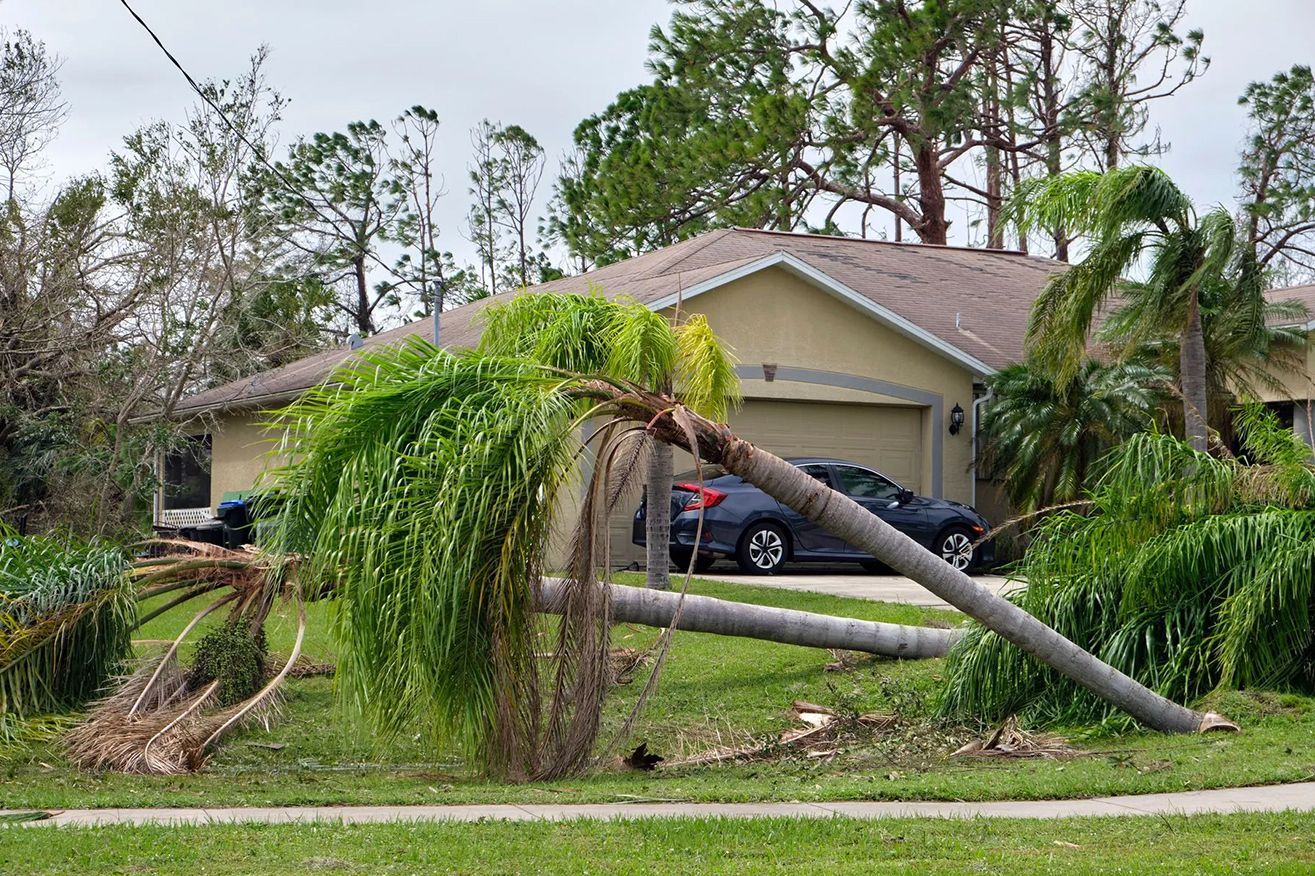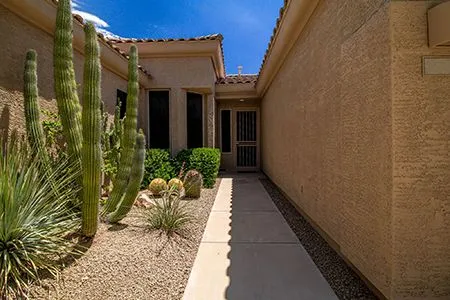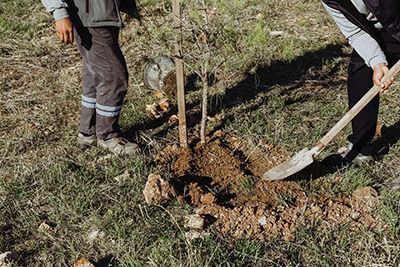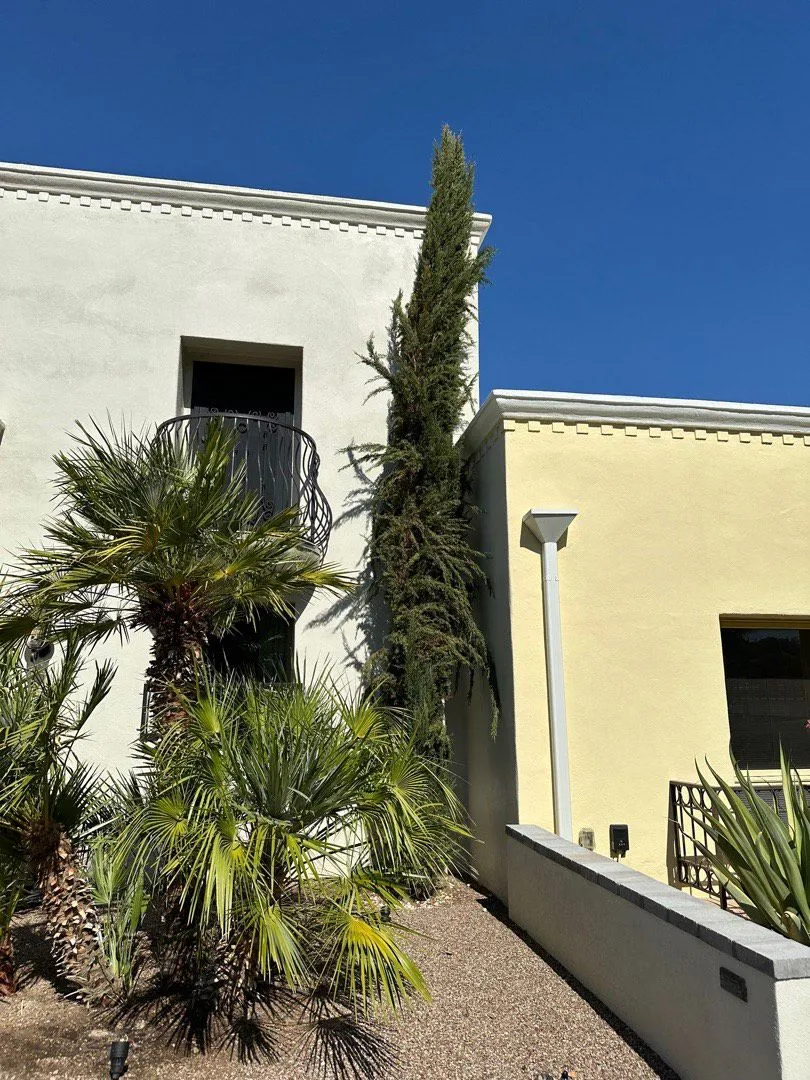Monday-Friday 6am-7pm | Saturday 8am-8pm
Para servicio en español llame al 520-614-6788
Tree Experts Blog

by Tree Experts
•
6 April 2025
Palm trees are iconic in Tucson, tall, dramatic, and undeniably southwestern. But like anything else in your landscape, palms have a life cycle. And sometimes, they become more of a hazard than an asset. Whether it's storm damage, disease, or overgrowth, knowing when to call in a professional for palm tree removal can save you a potential headache. When you need a palm tree removed in Tucson, AZ, or the surrounding areas, contact Tree Experts. It's Leaning or Unstable A healthy palm should grow straight and strong. If yours is leaning or looks like it's about to topple over, that's a serious red flag. This could be due to root damage, saturated soil, or strong winds. Tucson may be dry most of the year, but monsoon season can do a number on unsteady trees. A professional arborist can assess and remove the risk safely before it falls. The Trunk Is Cracked or Rotting Take a look at the trunk. Is it splitting, oozing, or soft in spots? These are classic signs of internal decay or disease, which weakens the tree from the inside out. Arizona’s extreme temperatures and pests like palm weevils can speed up this process. Once structural integrity is compromised, removal is often the safest option. The Palm Is Dead or Dying If your palm has brown, dry fronds and no sign of green growth, it could be dead or too far gone to save. A dead palm isn’t just unsightly, it can become brittle and unpredictable, especially during high winds. Dead fronds can also fall without warning and injure someone below. It's Causing Property Issues Sometimes, a palm just grows in the wrong place. Maybe it’s too close to power lines, foundations, or underground pipes. Roots can wreak havoc on plumbing and concrete, while tall palms near buildings can become a fire hazard. In these cases, removing the tree now can prevent costly repairs later. Palm Tree Removal in Tucson, AZ When you hire Tree Experts for tree removal in Tucson, you can expect exceptional communication and superior results. We bring many years of experience to each job and have invested in modern equipment that allows us to quickly and safely perform tree cutting and removal services. Whether you have one tree that needs to come down because it is blocking your view, or many trees that are occupying space that could be better utilized, we’re here to help. Call us at 520-216-5690 . The local arborists at our tree care company look forward to providing you with a quote for professional Tucson tree removal costs.

by Tree Experts
•
9 March 2025
Spring in Tucson is a time of renewal and growth, offering the perfect opportunity to give your trees some extra attention. As temperatures begin to warm and the desert comes to life, proper tree care ensures that your landscape stays vibrant and healthy all year long. Check out our casual guide to help you navigate tree care during the spring season. When you need tree care services in Tucson, AZ, or the surrounding areas, contact Tree Experts. Watering Wisely Even though Tucson is known for its dry climate, spring still demands thoughtful watering. Newly planted trees or those showing signs of stress benefit from a deep, infrequent watering schedule. Aim to water in the early morning or late afternoon to reduce evaporation. Remember, consistency is key—too little water can stunt growth, while overwatering might lead to root rot. Pruning for Health and Shape Spring is an ideal time to prune your trees, removing dead or diseased branches and shaping them for optimal growth. Pruning encourages air circulation and sunlight penetration, which are vital for a tree's health. When trimming, be sure to use clean, sharp tools and follow proper techniques to avoid damaging the tree. If you’re unsure about how much to prune, consult a local arborist for expert guidance. Fertilizing with Care Your trees can benefit from a boost of nutrients during spring. A balanced, slow-release fertilizer can help promote new growth and fortify the tree’s defenses against the harsh desert climate. It’s important not to over-fertilize—always follow the manufacturer’s recommendations to prevent nutrient burn and other issues. Pest and Disease Monitoring The warmer weather can also bring an increase in pests and diseases. Keep an eye out for signs of infestation such as discolored leaves, unusual spotting, or visible pests on your trees. Early detection allows you to deal with problems before they escalate. Mulching for Moisture Retention Applying a layer of mulch around the base of your trees is a simple yet effective way to conserve soil moisture and regulate temperature. Organic mulches, such as shredded bark or wood chips, also improve soil quality over time as they break down. Just be sure to keep the mulch a few inches away from the trunk to prevent moisture-related diseases. Tree Care in Tucson, AZ When it comes to tree care in Tucson, trust the certified arborists at Tree Experts to assist with all of your needs. Our skilled team is dedicated to enhancing the health, safety, and aesthetics of your residential or commercial properties through expert tree trimming, pruning, and other services. With a focus on precision and sustainability, you can count on our top-notch Tucson tree services to maintain the vibrancy of your trees. Give us a call at 520-614-6788 to tell us about your needs and we would be happy to provide a quote or answer any questions you may have.

by Tree Experts
•
8 February 2025
Living in Tucson, where the sun shines abundantly and the desert thrives, your cacti are a vibrant part of your landscape. To keep your desert beauties healthy and flourishing, a little care goes a long way. Whether you have a towering saguaro or a striking San Pedro, here are some essential tips to ensure they thrive in your Tucson garden. For professional cactus care in Tucson, AZ, or the surrounding areas, contact Tree Experts. Saguaro The iconic saguaro cactus is a symbol of the American Southwest. These giants require full sun and well-draining soil to prevent root rot. Watering should be minimal; during the hot summer months, a deep watering every few weeks is usually sufficient, while in the winter, they might not need any extra water at all. Make sure to protect them from frost, as even these tough plants can be damaged by freezing temperatures. Prickly Pear Prickly pear cacti are not only admired for their flat, paddle-like pads but also for their bright, edible fruits. They thrive in full sun and sandy or rocky soils. Water sparingly—prickly pears are drought-tolerant and can store moisture within their pads. Occasional deep watering during prolonged dry spells is ideal, but be cautious not to overwater, as this can lead to rot. Prune dead pads to encourage new growth and maintain a neat appearance. San Pedro San Pedro cacti, known for their columnar shape and impressive height, prefer a similar environment to other desert species. These cacti enjoy ample sunlight and require infrequent watering; typically, a deep soak every few weeks during the summer, with even less during winter. Ensure the soil is well-aerated and drains quickly, and consider supplementing with a slow-release fertilizer in the spring to support healthy growth. Barrel Cactus Barrel cacti add a charming, rounded silhouette to your garden. They thrive in full sun and sandy soils, needing minimal water—just enough to keep them from drying out completely. Overwatering is a common mistake with barrel cacti, so let the soil dry out thoroughly between waterings. Their compact shape makes them less susceptible to wind damage, but still, providing a stable, well-drained spot is key. Cholla Cholla cacti are notorious for their spiky exteriors, which add a unique texture to any landscape. They prefer bright, direct sunlight and well-draining soils. Due to their dense spines, cholla often lose water quickly, so a light watering every few weeks is generally sufficient. Be extra cautious when handling or watering cholla to avoid injury, and make sure to clear surrounding debris that could retain moisture against the plant. Cactus Care in Tucson, AZ At Tree Experts, our team of cactus experts provides trimming, care, and removal for many different species. While we specialize in Saguaro cactus services, we also cater to the needs of prickly pear cactus, San Pedro cactus, barrel cactus, and cholla cactus. From health and wellness to pruning and cactus removal in Tucson and the neighboring communities, our goal is to help maximize your residential or commercial landscape's aesthetic appeal, safety, and usability. Call us at 520-216-5690 to learn more about our services in Tucson, AZ, and the surrounding areas.

by Tree Experts
•
9 January 2025
Designing a desert-friendly landscape in Tucson means choosing trees that thrive in the region’s intense heat, limited rainfall, and dry soil. Selecting the right trees ensures your yard stays vibrant and low-maintenance while blending seamlessly with the unique beauty of the desert. When you’re ready to add a touch of greenery to your home or business in Tucson, AZ, or the surrounding areas, contact Tree Experts. Shade Providers for the Tucson Heat If shade is your priority, desert-adapted trees like the Mesquite and Palo Verde are excellent choices. Mesquite trees, known for their twisting trunks and delicate, fern-like leaves, grow quickly and provide broad shade canopies. Palo Verdes, Arizona's state tree, have striking green bark and yellow blooms that add color to your yard while requiring little water. The Desert Willow is another standout option. Its pink and lavender trumpet-shaped flowers attract hummingbirds, making it a favorite among wildlife enthusiasts. Cactus Trees for a True Desert Vibe Cacti are iconic in the Southwest and can serve as stunning focal points. The Saguaro Cactus, a symbol of Arizona, adds drama with its towering stature and branching arms. Another option is the Organ Pipe Cactus, which grows multiple vertical stems and provides a sculptural aesthetic. Both thrive in full sun and require minimal watering. Palm Trees for a Tropical Touch Adding palm trees to your desert landscape brings a touch of the tropics without sacrificing drought tolerance. The California Fan Palm, also called the Desert Fan Palm, is an excellent choice for Tucson. Its broad, fan-shaped leaves and tall trunk create an elegant look while thriving in dry conditions. The Mexican Blue Palm, with its striking blue-gray fronds, is another hardy option that adds unique color and texture. Tips for Planting No matter what trees you choose, ensure they’re planted in well-draining soil and get deep, infrequent watering to establish roots. Adding mulch around the base can help retain moisture and regulate soil temperature. Tree Planting in Tucson, AZ At Tree Experts, we believe that planting trees is an investment in the future. Our tree planting services can enhance your residential or commercial property by adding a diverse selection of native and adapted tree species. We carefully consider your preferences, the type of soil and its available nutrients, and our local climate, to ensure the successful establishment of trees that will thrive and add value to your surroundings. Call us at 520-216-5690 . We’d be happy to help you source trees and provide an estimate for the cost of tree planting in Tucson.

by Tree Experts
•
6 December 2024
Palm trees add tropical charm to Arizona's desert landscape. Despite their iconic status, these trees are susceptible to pests which can threaten their health and beauty. Recognizing the most frequent offenders and understanding how to address them is essential for maintaining healthy, vibrant palms. When you need palm tree care in Tucson, AZ, or the surrounding areas, contact Tree Experts. Red Palm Weevils Red palm weevils are among the most destructive pests for palm trees. These insects lay eggs inside the trunk, and their larvae burrow deep, weakening the tree’s structure. Infestation signs include small holes in the trunk, leaking sap, and a declining canopy. Without prompt action, these pests can cause significant structural damage. Regular inspections and early treatment are vital to protect your palms. Palm Leaf Skeletonizers Palm leaf skeletonizers are tiny pests that feed on the fronds, creating a webbed pattern that gives the leaves a skeleton-like appearance. This damage reduces the tree's ability to photosynthesize, hindering its growth. Early detection is key. Trimming the damaged fronds and applying insecticides can effectively control these pests. Spider Mites Spider mites thrive in Arizona’s hot, dry climate and can wreak havoc on palm fronds. These tiny pests form webs and suck sap from the leaves, causing them to turn yellow or brown. Washing the fronds regularly and applying miticides can help manage infestations and keep your trees healthy. Palmetto Weevils Palmetto weevils often attack stressed or dying palms but can also affect healthy ones. Signs of an infestation include wilting or collapsing crowns. Severely infested trees should be removed to prevent the spread of these pests. Keeping your palms well-watered and fertilized can improve their resilience and reduce the risk of attack. Aphids and Mealybugs Aphids and mealybugs feed on palm sap, often leading to the development of sooty mold on the fronds, which can harm the tree’s appearance and health. Introducing natural predators like ladybugs or applying insecticides can help control these pests. Tree Care in Tucson, AZ When it comes to tree care in Tucson, trust the certified arborists at Tree Experts to assist with all of your needs. Our skilled team is dedicated to enhancing the health, safety, and aesthetics of your residential or commercial properties through expert tree trimming, pruning, and other services. With a focus on precision and sustainability, you can count on our top-notch Tucson tree services to maintain the vibrancy of your trees. Give us a call at 520-216-5690 to tell us about your needs and we would be happy to provide a quote or answer any questions you may have.
Estimate Request
Please fill in the form below and we'll have a representative contact you.
Thank you for contacting us.
We will get back to you as soon as possible.
We will get back to you as soon as possible.
Oops, there was an error sending your message.
Please try again later.
Please try again later.
About Us
Family owned and operated Tree Experts is Tucson’s trusted resource for tree removal, tree maintenance and tree planting services.
© 2025
All Rights Reserved


